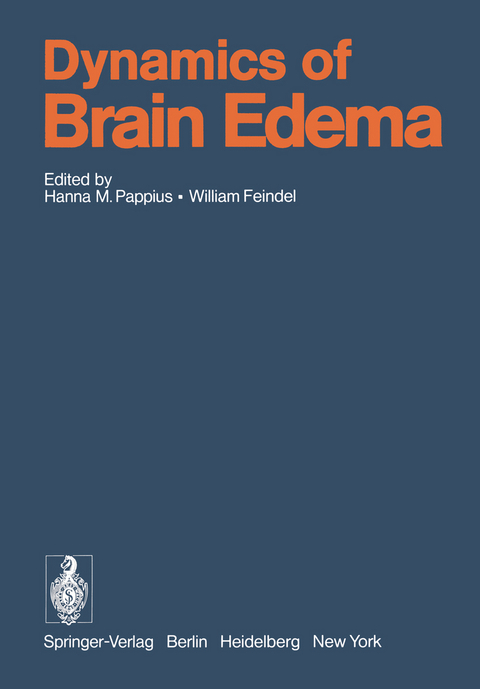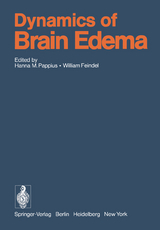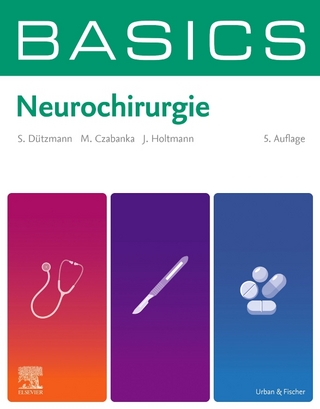Dynamics of Brain Edema
Springer Berlin (Verlag)
978-3-540-08009-1 (ISBN)
Section I Blood-Brain Barrier and Its Disturbances Chairmen: R.A. Fishman and I. Klatzo.- 1. Transport Properties of Capillaries Isolated From the Brain.- 2. Central Noradrenergic Regulation of Brain Microcirculation.- 3. Absence of Brain Edema After Reversible Osmotic Opening of the Blood-Brain Barrier.- 4. Bypass of the Blood-Brain Barrier to Proteins Without Brain Tissue Damage.- 5. Water Content of Rat Brain in Acute Arterial Hypertension.- 6. Determination of Cerebral Edema by Quantitative Morphometry.- 7. The Blood-Brain Barrier in Experimental Seizures.- 8. An Ultrastructural Substrate for the Resolution of Post-Irradiation Brain Edema.- 9. Delayed Vasogenic Edema Following Irradiation of the Monkey Brain.- Section II Vasogenic Edema Chairmen: J.B. Brierley, K.A.C. Elliott, D.M. Long, and F. Plum.- 1. Early Hemodynamic Changes at the Microcirculatory Level Following Focal Cryogenic Injury Over the Cortex.- 2. The Starling Hypothesis of Capillary Fluid Exchange in Relation to Brain Edema.- 3. Cerebrovascular Reactivity Related to Focal Brain Edema in the Primate.- 4. Brain Edema and Blood Pressure Measurements in Unanesthetized Hypertensive Rats with Cortical Lesions.- 5. Triethyl Tin-Induced Cerebral Edema: Implications for Determination of Cerebral Blood Flow in Edematous Tissue.- 6. The Movements of Water and Solutes in the Brains of Mammals.- 7. Production, Circulation and Absorption of Brain Interstitial Fluid.- 8. Clearance of Serum Albumin From Brain Extracellular Fluid: A Possible Role in Cerebral Edema.- 9. The Role of Tissue Pressure and Bulk Flow in the Formation and Resolution of Cold-Induced Edema.- 10. The Time Course of Brain Tissue Pressure and Local CBF in Vasogenic Edema.- 11. The Dynamics of Small and Large Molecules in the Extracellular Space and Cerebrospinal Fluid Following Local Cold Injury of the Cortex.- 12. Movement of Water Between Blood, Brain and CSF in Cerebral Edema.- 13. Some Further Studies on Vasogenic Edema.- 14. The EEG in Cerebral Edema.- 15. The Role of Monoamines in the Development of Cold-Induced Edema.- 16. Dependence of Traumatic Brain Edema on Immunologic Reactivity Against Tissue Antigens.- 17. Tissue and Plasma Factors in Cerebral Edema.- 18. Changes in the Sulfhydryl Group Level and Influence of Exogenous Glutathione on Dynamics of Vasogenic Brain Edema.- Section III Edema Associated with Ischemia Chairmen: W.F. Caveness and T.W. Langfitt.- 1. Pathophysiologic Aspects of Ischemic Edema.- 2. Transport Studies in Ischemic Cerebral Edema.- 3. Monoamines in Cerebral Ischemia in Relation to Brain Edema.- 4. The Role of Biogenic Amines in the Progression of Cerebral Ischemia and Edema: Modification by p-Chlorophenylalanine, Methysergide, and Pentoxyfilline.- 5. The Role of Monoamines and Cyclic AMP in Ischemic Brain Edema.- 6. The "Low-Flow" State Following Total Cerebral Ischemia.- 7. Development and Resolution of Ischemic Brain Swelling.- 8. Edema Formation in the Isolated Canine Brain: Anoxia vs. Ischemia.- 9. Microvascular Alterations and Edema in Focal Cerebral Ischemia.- 10. Hemispheral Ischemic Cerebral Cortical Edema in a Primate (M. Mulatta).- 11. Relationship Between Ischemic Neuronal Damage and Edema in Primate and Rodent Brain.- 12. Ischemic Cerebral Edema and Hyperemia in the Process of Cerebral Infarction.- Section IV Clinical and Therapeutic Considerations Chairmen: R. Ethier, W. Feindel, and H.J. Reulen.- 1. Water, Specific Gravity and Histology as Determinants of Diagnostic Computerized Cranial Tomography (CCT).- 2. Computed Tomography of Vasogenic Cerebral Edema.- 3.CT Findings in Brain Edema Compared with Direct Chemical Analysis of Tissue Samples.- 4. Cerebral Edema and Blood Volume in Man Measured by CT Scan.- 5. A New Therapy Regimen for Brain Edema.- 6. The Effect of Dexamethasone and Diuretics on Peritumor Brain Edema: Comparative Study of Tissue Water Content and CT.- 7. Ultrastructural Studies on Formation of Edema and Its Treatment Following Experimental Brain Infarction in Monkeys.- 8. Experimental Spinal Cord Injury: Effects of Steroids and/or Cooling on Edema, Electrolytes, and Motor Recovery.- 9. Brain Edema After Head Injury.- 10. Effects of Glycerol Treatment on CSF Pressure and rCBF in Patients With Cerebral Infarction.- 11. The Effect of Dexamethasone on Intracranial Pressure in Patients with Supratentorial Tumors.- 12. Double-Blind Study on the Effects of Steroids on Severe Closed Head Injury.- 13. Re-evaluation of Short-Term Steroid Therapy for Perifocal Brain Edema.- 14. The Influence of Various Doses of Dexamethasone on Intracranial Pressure in Patients with Severe Head Injury.- Clinical Panel Discussion: Current Modes of Therapy.- Workshop Summary.- Selected Discussions. Sections I-IV.
| Erscheint lt. Verlag | 1.12.1976 |
|---|---|
| Zusatzinfo | XIV, 404 p. 28 illus. |
| Verlagsort | Berlin |
| Sprache | englisch |
| Maße | 170 x 244 mm |
| Gewicht | 840 g |
| Themenwelt | Medizinische Fachgebiete ► Chirurgie ► Neurochirurgie |
| Medizin / Pharmazie ► Medizinische Fachgebiete ► Neurologie | |
| Schlagworte | brain • Cerebral ischemia • Head • Head Injury • Histology • Intracranial pressure • Neurology • neurosurgery • spinal cord • stroke • Surgery • therapy • Trauma • Tumor • Urology |
| ISBN-10 | 3-540-08009-0 / 3540080090 |
| ISBN-13 | 978-3-540-08009-1 / 9783540080091 |
| Zustand | Neuware |
| Informationen gemäß Produktsicherheitsverordnung (GPSR) | |
| Haben Sie eine Frage zum Produkt? |
aus dem Bereich




